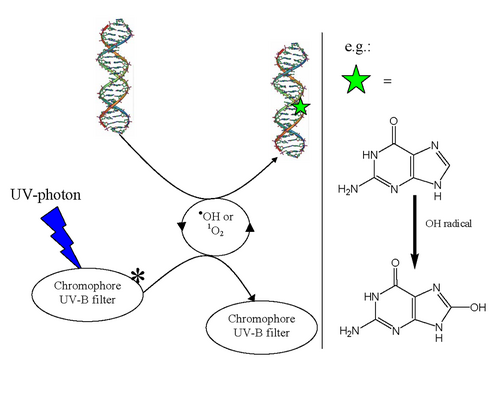Physics:Indirect DNA damage
This article's factual accuracy is disputed. (April 2020) (Learn how and when to remove this template message) |

Indirect DNA damage occurs when a UV-photon is absorbed in the human skin by a chromophore that does not have the ability to convert the energy into harmless heat very quickly.[2] Molecules that do not have this ability have a long-lived excited state. This long lifetime leads to a high probability for reactions with other molecules—so-called bimolecular reactions.[2] Melanin[dubious ] [citation needed] and DNA have extremely short excited state lifetimes in the range of a few femtoseconds (10−15s).[3] The excited state lifetime of compounds used in sunscreens such as menthyl anthranilate, avobenzone or padimate O is 1,000 to 1,000,000 times longer than that of melanin,[2] and therefore they may cause damage to living cells that come in contact with them.[4][5][6][7]
The molecule that originally absorbs the UV-photon is called a "chromophore". Bimolecular reactions can occur either between the excited chromophore and DNA or between the excited chromophore and another species, to produce free radicals and reactive oxygen species. These reactive chemical species can reach DNA by diffusion and the bimolecular reaction damages the DNA (oxidative stress). It is important to note that, unlike direct DNA damage which causes sunburn, indirect DNA damage does not result in any warning signal or pain in the human body.
The bimolecular reactions that cause the indirect DNA damage are illustrated in the figure:
1O2 is reactive harmful singlet oxygen:
Location of the damage
Unlike direct DNA damage, which occurs in areas directly exposed to UV-B light, reactive chemical species can travel through the body and affect other areas—possibly even inner organs. [dubious ] The traveling nature of the indirect DNA damage can be seen in the fact that the malignant melanoma can occur in places that are not directly illuminated by the sun—in contrast to basal-cell carcinoma and squamous cell carcinoma, which appear only on directly illuminated locations on the body. [dubious ] [citation needed]
See also
References
- ↑ 1.0 1.1 Ribeiro, D. T.; Madzak, C.; Sarasin, A.; Mascio, P. Di; Sies, H.; Menck, C. F. M. (January 1992). "Singlet Oxygen Induced DNA Damage and Mutagenicity in a Single-Stranded Sv40-Based Shuttle Vector". Photochemistry and Photobiology 55 (1): 39–45. doi:10.1111/j.1751-1097.1992.tb04207.x. PMID 1318549.
- ↑ 2.0 2.1 2.2 Cantrell, Ann; McGarvey, David J (2001). "3(Sun Protection in Man)". Comprehensive Series in Photosciences 495: 497–519. CAN 137:43484.
- ↑ "Ultrafast internal conversion of DNA". http://www.chemistry.ohio-state.edu/~kohler/dna.html.
- ↑ Armeni, Tatiana et al. (2004). "Lack of in vitro protection by a common sunscreen ingredient on UVA-induced cytotoxicity in keratinocytes.". Toxicology 203 (1–3): 165–178. doi:10.1016/j.tox.2004.06.008. PMID 15363592.
- ↑ Knowland, John; McKenzie, Edward A.; McHugh, Peter J.; Cridland, Nigel A. (1993). "Sunlight-induced mutagenicity of a common sunscreen ingredient". FEBS Letters 324 (3): 309–313. doi:10.1016/0014-5793(93)80141-G. PMID 8405372.
- ↑ Mosley, C N; Wang, L; Gilley, S; Wang, S; Yu, H (2007). "Light-Induced Cytotoxicity and Genotoxicity of a Sunscreen Agent, 2-Phenylbenzimidazol in Salmonella typhimurium TA 102 and HaCaT Keratinocytes". International Journal of Environmental Research and Public Health 4 (2): 126–131. doi:10.3390/ijerph2007040006. PMID 17617675.
- ↑ Xu, C.; Green, Adele; Parisi, Alfio; Parsons, Peter G (2001). "Photosensitization of the Sunscreen Octyl p-Dimethylaminobenzoate b UVA in Human Melanocytes but not in Keratinocytes". Photochemistry and Photobiology 73 (6): 600–604. doi:10.1562/0031-8655(2001)073<0600:POTSOP>2.0.CO;2. ISSN 0031-8655. PMID 11421064.
 |
